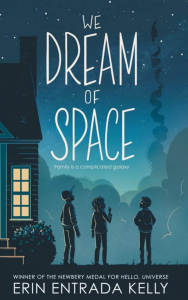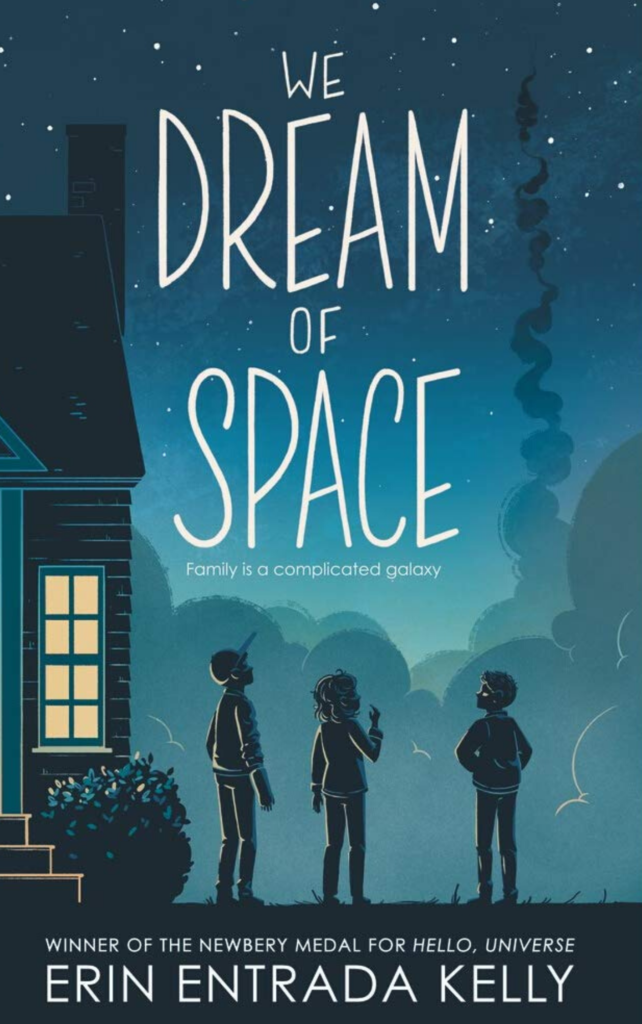 Whether readers celebrate National Space Day in May, World Space Week in October, or simply dream of someday being an astronaut, We Dream of Space by Erin Entrada Kelly is an inspiring book. It will also appeal to those who enjoy arcade games or who have ever wondered about family, friendship, tragedy, science, and exploration.
Whether readers celebrate National Space Day in May, World Space Week in October, or simply dream of someday being an astronaut, We Dream of Space by Erin Entrada Kelly is an inspiring book. It will also appeal to those who enjoy arcade games or who have ever wondered about family, friendship, tragedy, science, and exploration.
Kelly’s book follows three plot threads as it accompanies the experiences of Henry Nelson Thomas (aka Fitch), Bernadette Nelson Thomas (aka Bird), and Cash Nelson Thomas. The perspectives of these three siblings add unique insights to being twelve and thirteen while living in Delaware in the 1980s.
Fitch received his nickname because he pitches a fit when someone messes with his things, while Bird earned hers when her twin brother Henry struggled to pronounce Bernadette. Bird also draws diagrams and schematics with a bird’s eye view to capture her imagination of things disassembled and to reflect her love for science.
Bird also knows that families are complicated machines, and her parents tend to argue and shout an inordinate amount of the time. Bird longs for someone even-tempered, calm, predictable, and organized to provide a role model. She finds those traits in Ms. Salonga, who prioritizes science and celebrates Space Month at Park Middle School.
Although President Reagan selected Christa McAuliffe in 1985 to be the next teacher in space, Ms. Salonga had applied, and her enthusiasm for space comes through in her teaching. When she launches Space Month in school in anticipation of the launch of the Challenger space shuttle, each student plays a role on a flight crew. Bird takes her role as mission specialist seriously, even imagining a connection with Judith Resnik.
Danielle Logan is shuttle commander of Bird’s shuttle crew, so the two girls form a bond. Bird learns that Dani enjoys tree houses and consensus at her home—giving Bird three reasons to be envious of Dani. Dani is also physically attractive, while Bird is plain, according to other students.
During an imaginary conversation with Judith, Bird learns that pretty isn’t exactly real. “It’s one person looking at another and saying yes or no, based on their own personal judgements. . . . Pretty is what you make it” (150). So, Bird decides she has no use for something so unscientific and that being smart is pretty enough for her.
Bird retains that belief until the Challenger space shuttle explodes. The explosion rocks her world in significant ways. Disillusioned and now wishing to be invisible, Bird burrows into her brain and reconstructs her thoughts. She decides not to expect anything from herself or from anyone else and adopts the mantra: “If you have no expectations, you have no disappointments” (365).
Meanwhile, Bird’s twin brother Fitch spends his afternoons at the local arcade, more content with the success he has with machines than with unpredictable people. His friend Vern teases Fitch incessantly, and when the harassment reaches a boiling point, Fitch—who is known for his volatile temper—erupts. The fall-out not only affects Fitch, who gets suspended for three days, but also impacts Amanda Piper and Marshall, a young boy who looks up to Fitch’s talent at the arcade and asks whether Fitch will teach him to play. Ultimately, Fitch learns that jokes don’t always land softly and that no one deserves to be treated with cruelty.
In a third orbit, the twins’ older brother Cash is repeating seventh grade because he struggles with school. After breaking his wrist and confronting several truths about himself, Cash rethinks his motivations and aspirations.
Mostly, though, this is Bird’s story. Despite having profound things to say, Bird isn’t sure anyone in her family is listening—until her brothers come to her rescue. Ultimately, she accepts that being small does not mean being inconsequential. She also realizes that nothing worthwhile is ever easy.
Through the three Nelson Thomas siblings, readers learn not to settle for what is easy. We further discover the power of taking on a challenge, even when we think the challenge is too difficult or when we fear failure.
- Posted by Donna

